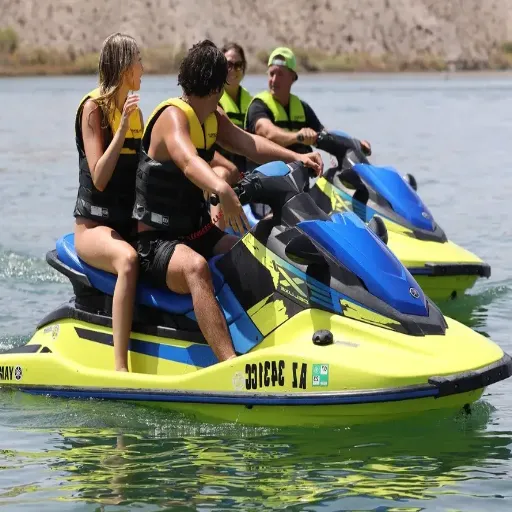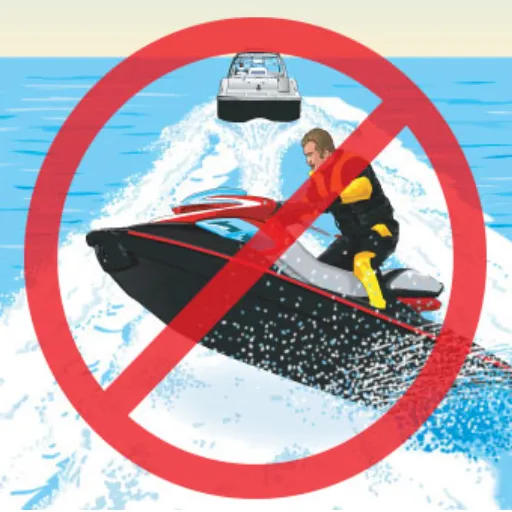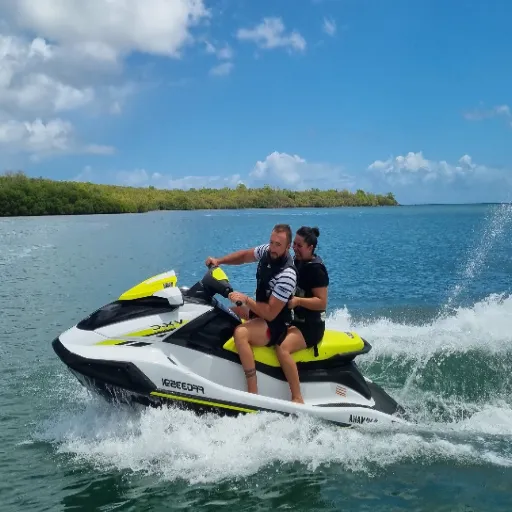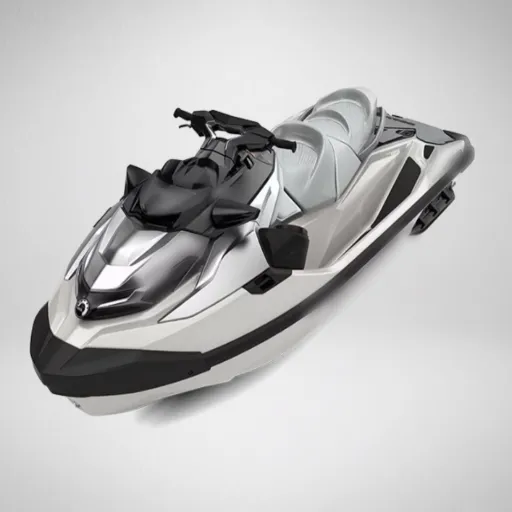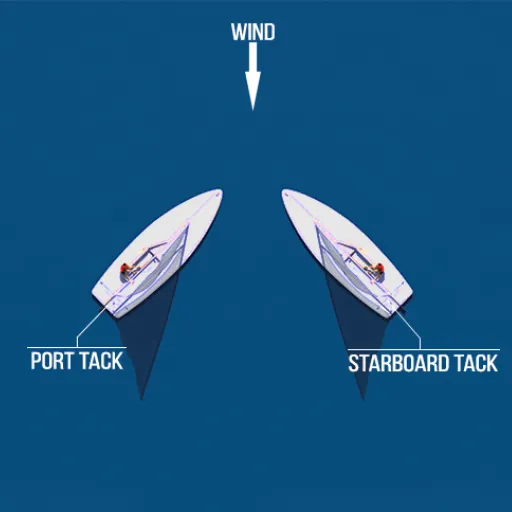Jet skiing is probably the most exciting way to get out and enjoy the open water. Still, the increasing popularity of the water sport also entails a rise in the significance of safety rules issued for the very safety of the users. Lying just around the corner, 2025 will, therefore, bring a fresh outbreak of age restrictions and regulatory policies pertaining to jet skis. Whether you’re a daredevil, a concerned parent, or simply want to ensure your colleagues avoid shortcuts in the latest policy, this guide will walk you through everything associated with the new age delimitations. This article will serve as a one-stop source for navigating the changing jet ski laws, covering everything from the reasons behind the introduction of the new rules to the potential ramifications of these regulations in various regions. Designating some time to familiarize yourself with these recent changes can set you up for an easy ride in 2025.
Overview of Jet Ski Age Restrictions
Making Age Limits for Personal Watercraft Important
Imposing an age limit for operating personal watercraft (PWC) is a very prime safety measure taken on the water. A minimum age is set to minimize accidents caused by inexperienced riders or those under the specified age limit. Studies conducted by maritime safety organizations in recent years have shown that younger operators statistically engage more in PWC-related incidents, with much of this attributed to their limited understanding of navigation rules or improper handling of glide maneuvers at high speeds. These age limit-related problems are addressed by ensuring that riders are indeed mature enough to comprehend what they are doing when operating a jet ski responsibly.
Age regulations, therefore, tend to serve environmental conservation by decreasing harmful behaviors that destabilize local ecosystems. In many jurisdictions, it is even a requirement that persons who satisfy the age requirement attend compulsory safety courses designed not just to instruct operators in the event of an emergency but also to communicate sustainable practices when using PWCs.
As more people worldwide use recreational watercraft, age limits remain an essential component of comprehensive water safety measures, striking a balance between enjoyment and responsibility on the water.
Current minimum age to operate a Jet Ski
Key Insight: Different jurisdictions have varying minimum ages for jet ski operations, but globally, a few trends are often observed.
For instance, in the United States, the minimum age for operating a jet ski independently stands at 16 years of age in most states. Those between 12 and 15 usually carry the privileges to operate under supervision or upon completion of an approved safety education course.
Countries like Australia and Canada follow somewhat similar laws, where the provinces or regions fix specific age limits. For instance, one must be at least 16 years old to acquire a Personal Watercraft License in Queensland. In any case, certain European countries, such as the UK, do not impose a strict legal minimum age but discourage operations without the training and supervision of new operators.
This is what safety is all about; these regulations have a twofold aim of ensuring the safe and responsible use of personal watercraft and limiting accidents while fostering an eco-friendly environment. Jet ski operators would benefit from knowing their local laws and licensing requirements before hitting the water, as noncompliance could lead to penalties or undesirable restrictions on operation.
Overview of Boating Laws Related to Age
Age requirements for boating laws vary primarily by country, state, or region. However, all are mainly intended to ensure safety and competence. For example, in many U.S. jurisdictions, a child younger than 12 years of age is not allowed to operate a motorized boat with a certain horsepower unless an adult is present. States such as California and Florida mandate boater education courses for younger operators, generally those under 16. Only after completing the course may they operate certain vessels unaided. There are similar guidelines in other countries as well, such as in Canada, where age and horsepower requirements apply to the possession of powered vessels.
By and large, more rigorous controls are imposed upon PWC operators, which jet skis fall into. Some regions enforce a minimum age requirement of 16 for solo operation, regardless of the engine size, aiming to protect young operators from becoming accident victims due to their inexperience. These age limits are typically established in conjunction with the prerequisites for obtaining a boating license or completing safety training. Data from maritime safety agencies suggest that accident rates and injury rates are significantly reduced when instructors provide proper education to those of responsible age operating vessels. Observing these stipulated regulations forms a safeguard that every operator needs to ensure their safety and the safety of others inhabiting the waterways.
State-Specific Regulations on Operating a Jet Ski
Setting Minimum Age by State
Each state sets its minimum ages for operating jet skis, trying to balance the right to recreation against safety concerns. A brief rundown of the current requirements follows:
| State | Minimum Age | Special Requirements |
|---|---|---|
| California | 16 years | Ages 12-15 may operate with direct supervision of licensed adult |
| Florida | 14 years | Must be 18+ to rent; safety course required for those born after Jan 1, 1988 |
| Texas | 13 years | Under 13 require supervision by 18+ adult with safety education |
| New York | 14 years | Must possess boating safety certificate; under 14 need 18+ companion |
| North Carolina | 14 years | Must complete state-approved boating safety education course |
These rules must encourage younger users to develop good safety practices while reducing their chances of being involved in accidents. An operator needs to understand the laws in their state and undertake appropriate safety training to comply with state law requirements and safety expectations before venturing into water.
Differing Age Restrictions Across the United States
The minimum age requirement to operate a jet ski may vary greatly from one state to another, influenced by local safety concerns and legislative priorities. For example, some states, like Florida, require those under 18 to have proof of completion of a boater safety course. California, meanwhile, has set a minimum age of 16 to operate a jet ski independently, with or without such certification.
In Texas, operators as young as 13 years can undertake riding, provided that such youth are accompanied by an adult aged at least 18 and who meets all legal requirements. Contrastingly, Pennsylvania requires individuals to be at least 12 years old to operate jet skis, but they must be supervised if under 16, unless the person has completed a certification course. These marginally contrasting stipulations underscore the importance of consultation with state authorities for a comprehensive understanding of age, certification, and supervision criteria related to the operation of personal watercraft.
Local variations can be influenced by the proximity of a popular water body or seasonal influxes of recreational activity, with stronger safety nets in place for managing operator skill levels and accident risks. Knowing these rules becomes essential for the sake of national compliance and water safety.
Case Studies: States with Special Jet Ski Laws
California
California has stricter-than-average jet ski laws to ensure more safety on its precious waterways. The use of a certified Boater Card is mandated for anyone below 35 years, with a major emphasis on the safe operation of personal watercraft being dictated by the state. There are also stringent emission standards, including a ban on older two-stroke engines, which are significant polluters. With these measures, the state ensures safe operations, while also reflecting its broader goal of preserving the environment.
Florida
Florida, known as the Sunshine State, with its vast coastlines and tourist-driven water sports, maintains a seasonal set of rules regarding jet ski operations. Operators must observe designated zones where speed limits are enforced to safeguard marine life, swimmers, and, in particular, areas frequented by manatees. Additionally, individuals under 21 must first complete an approved safety education course before being allowed to operate a jet ski. Balancing the priority of environmental safeguard with the need for high-volume recreational use, Florida’s rules are well-crafted.
Texas
Texas stands perhaps uniquely in enacting jet-ski laws, placing personal responsibility on the operators. The operation must eschew all acts of recklessness, including tight turns near other vessels or wake-jumping. Anyone between 13 and 17 years of age must obtain a boating safety instruction card in order to operate a jet ski legally. The Corpus penalties might be further meted out for contraventions of safe-distance rules, together with fines designed to prevent accidents in Texas’s popular lakes and rivers.
New York
New York’s approach prioritizes urban watercraft safety. Every jet ski operator in New York must carry a certificate of safety, regardless of age. Additionally, a noise ordinance exists for jet skis used in urban areas to minimize disturbances to residents and other coastal activities. Some seasonal restrictions are imposed as well, those of a more stringent nature during the months of greatest recreation, so as to keep congestion in waterways at a manageable level.
Wisconsin
In Wisconsin, such laws are age-specific for jet ski operators, referring more to young people standing instead of adults. Children from 12 to 15 years of age must complete a boater education program before operating a jet ski, and therefore, they need an adult to accompany them on the vessel to operate the jet ski legally. There are also unique restrictions applicable to hours in Wisconsin, where jet ski operation after sunset is prohibited to avoid accidents on less visible waters.
From the examples at the state level, it becomes apparent that the jet ski regulations appear to be targeted toward either regional needs, such as high protection for a local ecosystem, or urban safety concerns. A knowledge of this variation becomes crucial for any operator to comply with the laws and enjoy the water.
2025 Trends in Jet Ski Safety and Age Regulations
Emerging Safety Protocols for Young Jet Ski Riders
🚀 2025 Innovation Highlights
- GPS-based monitoring systems to track speeds and ensure safe operation limits
- Automatic engine cutoff technology that disengages when rider falls off
- Enhanced life jacket technology with improved flotation and visibility features
- Mandatory extensive training programs combining practical and theoretical education
Numerous innovative approaches are being developed due to advanced technologies and an increased focus on safety for young jet ski riders. Many states are considering requiring GPS-based monitoring systems to track speeds and ensure younger riders remain within safe limits for operation. Another safety device gaining favor is the automatic engine cutoff, which disengages the engine if the rider falls off, thereby minimizing the probability of injury.
Several states are mandating extensive training programs that will require a young rider to obtain their license only after completing both practical and theoretical training. The trainees learn to identify water hazards, keep adequate distance from other watercraft, and follow no-wake zones. Life jacket technology has also improved, providing lightweight yet durable solutions with flotation enhancement and visibility features, such as high-contrast colors and reflective panels.
Recent data have shown that states that mandate stringent training procedures and more advanced safety systems are currently experiencing significant reductions in accidents involving young riders. Emerging safety measures aim to merge technology, education, and regulation to make the young riders’ jet ski experience safer and more entertaining.
Boating Education Impact on Age Requirements
Boating education programs, therefore, demonstrate an educational element-they set age requirements and improve safety standards for young watercraft operators. Studies show that enrollments in boating safety courses increase compliance with regulations by a big margin and reduce accident rates for inexperienced child riders. These courses cover various subjects concerning important matters, including navigation rules, hazard recognition, and response techniques in emergency situations. These issues should ensure that young pilots can operate jet skis and boats responsibly.
Several states have adopted age-specific educational and certification requirements to ensure that younger users receive sufficient training before being licensed to operate watercraft. For instance, states that enforce mandatory education for operators under 16 have reported lower rates of property damage and personal injuries from operator error. Furthermore, advanced safety instruction—that is, accounting for weather condition factors and PFD use—has instilled in youngsters a culture of safety. By emphasizing these aspects in their education initiatives, policymakers are, on the one hand, trying to align regulations with safety trends and, on the other, promoting a culture that aids youth in making informed and responsible decisions concerning water.
Future Predictions for Jet Ski Age Limits
🔮 What’s Coming in 2025 and Beyond
- Increasing stringency in age limits as safety data becomes more precise
- Integration of GPS tracking and automated safety systems
- Potential middle-ground policies balancing accessibility with prevention
- Enhanced training requirements tied to age restrictions
Examining the prospects, it seems reasonable to expect increasing stringency in age limits for jet ski operation as safety and accountability come to the forefront of policy discussions. Precise statistics have been made accessible through technological advances in gathering incident data and reporting. Hence, reports indicate that most jet ski injury accidents involve operators under 18 years of age, thereby raising the discussion among lawmakers about increasing the legal age for operation.
In addition, other safety measures, such as comprehensive training, have emerged as possible complements to the age limits. Regions in which coursework was mandatory for young operators registered lower accident rates, implying that possibly tying stricter age restrictions with better education may be an added deterrent to further hazards. Policies of the future could be influenced by emerging new technologies, including GPS tracking and automated safety systems, to better equip younger operators for the responsibilities of jet ski operation. Altogether, the future of jet ski age limits appears to be heading toward a middle ground, with an emphasis on accessibility in recreation, safety, and prevention.
Renting a Jet Ski: Age Considerations
Minimum Age to Rent a Jet Ski
Depending on the location, a minimum age policy may apply for renting a jet ski; in most areas, this minimum age is 16 years. Operators younger than the minimum age may be allowed in some places, provided they have parental approval or a boating safety certificate. For instance, certain places with higher safety standards may have age requirements of 18 or above to rent a jet ski unescorted. Further, all states or countries often require a valid identification card proving that the person has completed a safety class, if applicable, before granting permission to rent.
Besides age considerations, liability concerns also come into play. Rental agencies often set age limits to satisfy their insurance policies and minimize the risk of accidents. The potential renter needs to understand that even if the minimum age is achieved, it still doesn’t substitute for following operational safety standards-the wearing of the right life jacket, abiding by waterway rules, etc. With these safeguards, greater safety and enjoyment are assured for both the renter and the operator when starting out on a jet ski.
Before Renting: Age Policies
Restrictions for jet ski rentals vary from one location to another and from one provider to another, but they are generally established in accordance with state and local regulations, with safety being paramount. For example, many states in the U.S. specify a minimum age of 16 for operating a jet ski, while others allow younger operators who have completed a boating safety course. A jet ski rental company can impose its age restrictions, which are often more stringent than state laws. Generally, renters have to be at least 18 years old. That is to say, they can either sign the contract or operate without supervision.
There are also age requirements that seem to intersect with or complement licensing or certification requirements. In some jurisdictions, operators must hold a valid boating license or pass a safety examination, irrespective of their age. Through these mechanisms, the goal is to limit accidents based on age and the users’ willingness to demonstrate a basic understanding of watercraft safety. A renter should always ensure that they understand the rental company’s age policies, including any additional requirements for parental supervision if minors are involved. By combining the two areas of age and education, everyone will be better equipped for an enjoyable, safer experience on the water.
Parental Consent and Young Riders
⚠️ Important Safety Statistics
70% of all watercraft accidents are reportedly caused by operators under 25 years of age, with inexperience as the biggest contributor.
A key element for younger riders is the consent of their parents, which ensures a level of safety and liability relative to the law. Many states and rental companies require that minors under a certain age obtain parental consent, duly signed by their parents, to operate or ride watercraft. The term “consent” refers to an acknowledgement of agreement by the guardian, which includes awareness of the risks and liabilities involved.
To prevent such situations, some jurisdictions impose additional conditions, such as mandatory parental supervision of minors, in addition to the requirement of witnessing consent. This serves to highlight further the importance of direct supervision for safety under guidance and accountability. When parents are informed of all protocols for consent and safety, they naturally act with full knowledge of the possible implications. By setting requirements for rentals and aligning them with local regulations that prioritize safety and watercraft operations, operators position themselves as proactive agents in providing a safe and pleasant experience for children in the water.
Tips for Parents and Young Riders
How to Operate a Jet Ski Safely
✅ Pre-Operation Safety Checklist
- Check jet ski condition (throttle, brakes, safety lanyard)
- Put on properly fitted life jacket
- Review local watercraft rules and regulations
- Keep operator’s manual handy for reference
When I think about operating a jet ski safely, I always like to first familiarize myself with the equipment and safety procedures. I first check the jet ski if it is in good operating condition by checking the throttle, brakes, and safety lanyard. As I put on a properly fitted life jacket, I review the local rules that may apply to watercraft along my route. For me, whether I am familiar or new, I realize that preparation is crucial if we want to have fun while staying safe.
Once I’m on the water, I suffice with a safe speed and watch for other watercraft activities, swimmers, and obstacles. Being alert helps me anticipate hazards and adjust my speed or direction accordingly. I also always use hand signals and respect no-wake zones, which are crucial in preventing accidents. Additionally, I keep the operator’s manual for the jet ski handy, especially when avoiding sharp or sudden turns that could cause someone to fall or result in a collision.
Clear communication becomes the top priority, especially for those riding with me and around me. If I’m accompanying younger riders or individuals new to jet skiing, I explain the fundamentals of balancing, keeping a steady grip, and what to do if they fall off. Through preparation, awareness, and communication, I can enjoy jet skiing thrills with an assurance of safety and respect for others on the water.
Boating Education Resources for Young Operators
🏫 Formal Education
- Local boating safety courses
- U.S. Coast Guard programs
- NASBLA certified training
- State-required safety courses
📱 Digital Resources
- Boating safety apps
- BoatEd online courses
- Interactive tutorials
- Weather and navigation apps
👥 Practical Learning
- Mentorship with experienced boaters
- Hands-on water experience
- Supervised practice sessions
- Atmospheric learning environments
When considering learning resources for boating, my first recommendation is local boating safety courses. Most states require young boaters to take an approved safety course before operating a vessel, so these classes teach the basics, including rules of navigation, equipment requirements, and emergency measures. I would say that the U.S. Coast Guard, as well as other organizations such as the National Association of State Boating Law Administrators (NASBLA), offer excellent programs with wide recognition and that provide a solid foundation of knowledge. In many states, it is indeed a legal requirement to take one of these courses; furthermore, it enables young boat operators to build confidence and act responsibly once they are out on the water.
Additionally, I encourage youngsters to explore boating apps that provide real-time weather updates, navigation assistance, and safety tips while on the water. Sites like BoatEd or even some state-specific sites will have fun, interactive tutorials designed with youngsters in mind, making the whole learning process easier and more enjoyable. Beyond the formal resources, few things beat atmospheric learning. A young operator tagging along with an experienced boater, watching and listening to the thought process behind decisions made in various conditions, fosters the learning of practical skills that the youngster will need to develop independently.
My approach toward helping young operators and trainers is to provide a balance between theory and practice. They are encouraged to refresh their skills regularly, stay aware of local waterway regulations, and practice safe marine ethics. This ensures maximum safety and enjoyment on the water. With the resources available today, young operators can quickly acquire the skills and self-confidence necessary to practice their craft responsibly.
Jet Ski Gentlemen: Some Useful Tips for the First-Timers
🌊 First-Timer Essentials
- Safety Equipment: Well-fitting life jacket, whistle, and gloves
- Weather Check: Calm water and clear skies are best for beginners
- Equipment Familiarization: Understand turning, accelerating, and stopping
- Designated Areas: Use approved boating areas and follow local regulations
Initially, using the jet ski made me realize that it is best to prepare and remain aware of the environment to have a smooth and enjoyable experience on the water. Some of the good habits followed included always carrying safety equipment, such as a well-fitting life jacket, a whistle, and gloves that would help hold on better. Checking the weather was perhaps the next big thing on my list. For a complete beginner, the safest period is usually when the water is calm and the skies are clear. I also kept in mind to familiarize myself with the controls and features of the jet ski. Once I understood how it worked in terms of turning, accelerating, and stopping, I must say that I was fairly confident about operating it for the very first time.
Another practice that surely helped me was to go to designated boating areas and comply with local waterway regulations. Rules are in place so that all people are safe and have a positive experience in the water. I stayed alert and respectful of the presence of other vessels, swimmers, and marine life, which made me feel more aware and in control. I tried to keep my speed low most of the time, though I admit that, especially when starting, it’s pretty exciting to feel the power of a jet ski! Safety took priority.
Lastly, I found that starting with shorter rides and working my way up to endurance allowed me to gain experience and skills without pressure. Through lots of practice and safety in mind, my confidence grew, and I was able to enjoy and create some excellent memories on the water.
Reference Sources
-
How Old Do You Need to Be to Operate a Jet Ski Safely? – At The Bridge Rentals
Discusses age requirements for jet ski operation, which vary between 12 to 16 years old in different regions. -
How Old Do You Need to Be to Operate a Jet Ski Safely? – Jet Skis Ahoy Rentals
Provides a detailed guide on state-specific age regulations for legal jet ski operation. -
Laws & Safety – Boating – NC Wildlife
Outlines age restrictions, including a minimum age of 14 for operating personal watercraft in certain areas. -
New Boater Education Law – Minnesota DNR
Highlights new boating education laws effective from July 1, 2025, including age requirements for jet ski operation. -
The Minimum Age Requirements To Operate a Jet Ski Safely – Jet Ski Rental Arizona
Explains the minimum age requirements, typically ranging from 12 to 16 years, along with key safety guidelines. - Click here to read more.
Frequently Asked Questions (FAQs)
❓ What is the minimum operating age of a PWC?
The minimum age for operating a personal watercraft varies between states, but is typically set at 14. PWC operators below that age can generally be allowed to operate under adult supervision; for example, some jurisdictions allow a 12-year-old to operate a PWC with an adult present. Examining local regulations is crucial, as some may require the person to complete a boating safety education course before allowing a minor to operate a jet ski. Additionally, most states require children under 18 to complete an approved boating safety course to ensure their safety while operating a PWC.
❓ What is the operating age requirement for jet ski operators?
Almost everywhere, jet ski operators must be at least 14 years of age to operate a jet ski alone. Many states impose additional age requirements, requiring riders to be 16 years of age or older to operate without adult supervision. Operators must also generally complete a boating safety education course to qualify. Potential jet skiers must, therefore, acquaint themselves with the particular age limits and safety regulations in their state.
❓ Can a person under 12 years old operate a jet ski?
Generally, operators under 12 years of age are strictly prohibited from operating. The strict laws of most states forbid the operation of a PWC by any person under 12 years of age. However, individuals between 12 and 16 years of age may operate the vessel with the escort of an adult 18 years or older. This supervision would enable younger riders to become familiar with safe methods while enjoying the sport.
❓ What is the minimum age required for jet ski rentals?
The age requirement to rent a jet ski is typically set at 18 years old or higher in most rental establishments. Individuals under 18 may occasionally rent a jet ski if they have completed an approved boating safety education course. Identification and proof of course completion are usually mandatory. It would be best if potential renters verified such requirements beforehand with the rental establishment.
❓ What kind of safety education grants one to operate a jet ski?
In many states, you must pass a boating safety education course to be on the water legally with a jet ski. This course trains students in boating safety, navigation rules, and emergency procedures. Before an operator is allowed to operate any personal watercraft without supervision, they must prove they are at least 16 years old. Additionally, some operators may be required to take a course with another person. Apart from age restrictions, the course is designed to ensure the safety of all jet-ski operators when navigating waters.




